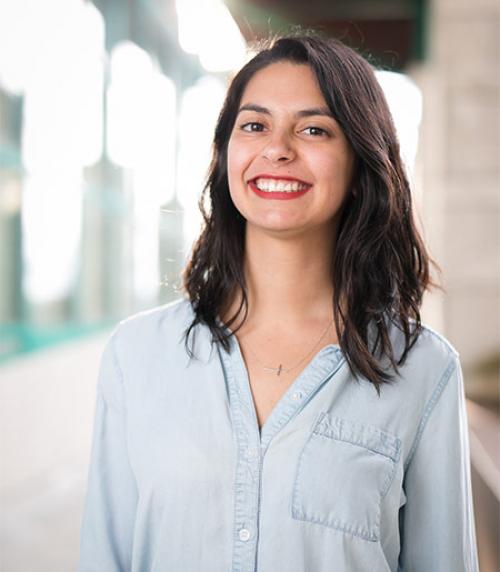Karen Monique Loya
Sociology & Latina/o Studies
McAllen, TX
What are the most valuable skills you gained from your Arts & Sciences education?
I think the most valuable skill I’ve learned is taking initiative. Arts & Sciences always had an endless amount of opportunities and I learned that I had to take it upon myself to reach for them. When I first spoke to my new faculty advisor junior year, he immediately added me on to his research team so I could get experience. I attended a guest lecture in the Latin American Studies Department my sophomore year that inspired me to take more classes, and now I’m finishing up the minor. There are many research opportunities, guest lectures, chances to talk to professors or to land an internship you really like. You never know when you will learn something that will change the course of your academic interests, or when you will meet someone who will help you take the next step in your career path. My Arts & Sciences education pushed me to explore areas of studies and opportunities that I didn’t know I would love when I first came to Cornell.
What is your main extracurricular activity--why is it important to you?
I am a co-chair of La Asociación Latina, the umbrella-Latinx organization on campus under the ALANA board. I first joined this e-board the spring of my sophomore year and have stayed on ever since. LAL gives me the platform to create widespread support for the community I hold dearest at Cornell by interacting with many student leaders and creating large-scale programming. This e-board has become one of my favorite homes at school—I’ve gotten to meet amazing people through my time on LAL, many who I have looked up to and who have supported me through my toughest moments. I have also grown a lot as a leader during my time as co-chair. I’ve grown tougher skin through the tense situations that come with the position; I’ve learned how to balance leading by example with leaning on the other members; I’ve learned that I can’t fix all the issues of the community within my time at Cornell, but the best I can do is make sure steps are being taken in the right direction. I am grateful for the opportunity to have grown in LAL and I'll always cherish my time with the org.
How have you changed since you first arrived at Cornell? What have you discovered about yourself?
In four years, I think the most valuable change I've gone through is that I have grown to be comfortable with myself. I'm no longer stressed about not knowing what I want to do in life or with narrowing down my interests and passions. I've learned that although I may not be the loudest, most confident, or even smartest person in a space, I can still be an amazing leader. I've discovered (through many falls and struggles) that asking for help does not make me weak or incapable, but rather puts me on the path of resilience. I also have learned to not feel guilty for putting my health before academics or extracurriculars. All of these lessons were not learned solely in the classroom—through my leadership positions and just by being a student, I’ve grown happy with how I have chosen to view my capabilities and priorities.
If you were to offer advice to an incoming first year student, what would you say?
Know your school’s resources, no matter where you are. If you're studying abroad or will stay on campus for all four years, get to know the inside of the school rather than getting a bird’s-eye-view of where things and people are. Get to know what people to go to when you have personal issues, have questions for your math problem-set, or want to know where the best dining hall is. Ask questions that you wouldn’t necessarily ask on traditional campus tours; try to get a real feel of being a student on campus by asking personal opinions or experiences from the students who go there. You can get all the information about where buildings are, the history of the school, and awards and recognitions online, so make the most of the insiders view of what your school has to offer whether it be people, programs, offices, or safe spaces.




